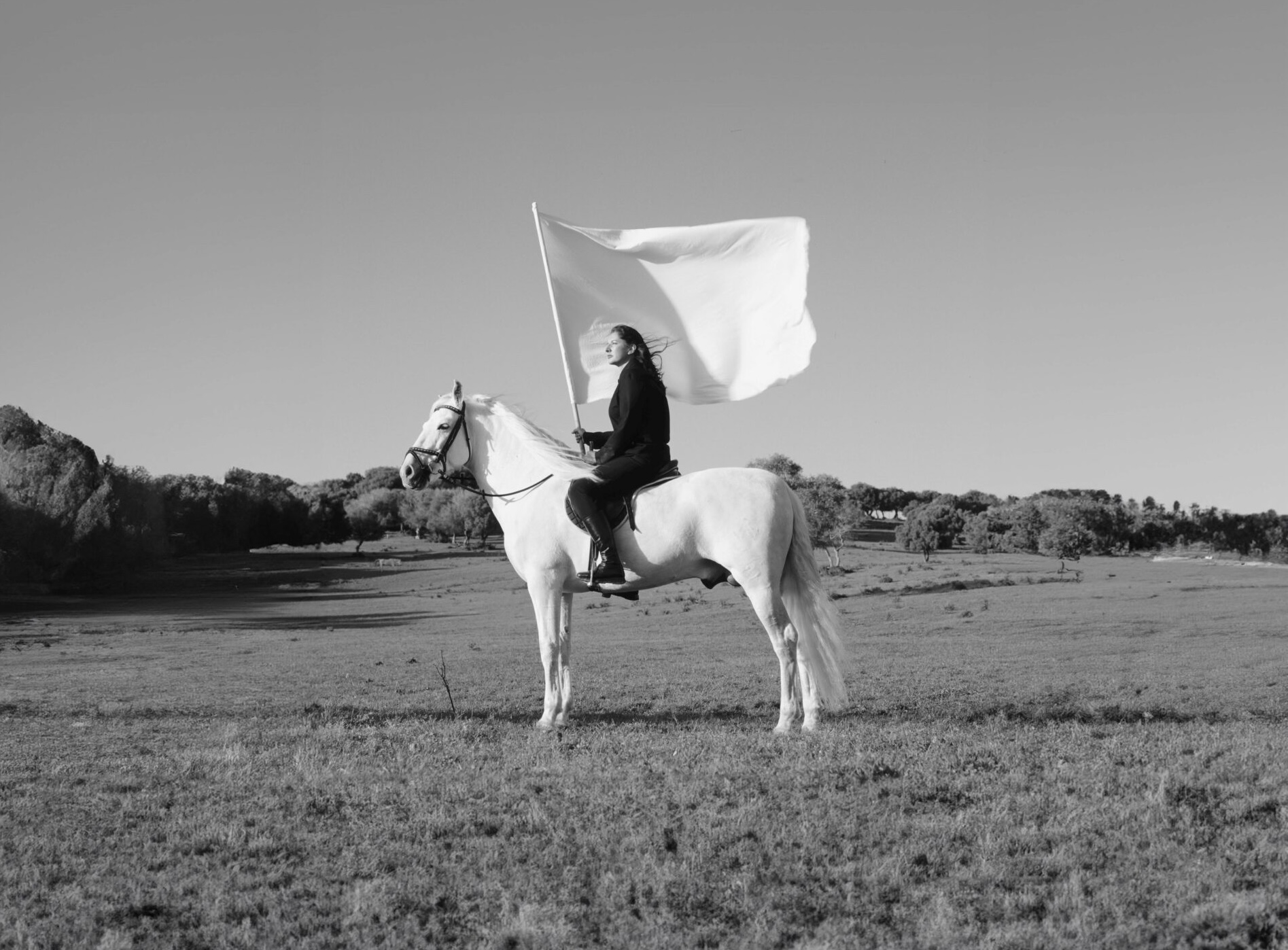

**John Maus** | images by Max Montgomery | FASHION CREDIT: **TOPMAN** t-shirt.
* * *
Talking to singer, composer, and academic John Maus is sort of like experiencing his music for the first time: an enigmatic, heady, and at times indecipherable experience, though always profound, surprising, and delightful. When we speak, he is once again ensconced in his secluded work-nook in Austin, Minnesota—his birthplace, and a location that, regardless of where he is in life, Maus always seems to find his way back home to.
The off-the-map environment (one of Austin’s few points of interest is a SPAM Museum) is reflected in his idiosyncratic music, as if a bird as strange and beautiful as Maus might just require an unusual perch. I ask him whether this apparent isolation from the public was intentional. “I never preferred it,” he tells me. “It is interesting what it can do, in the central solitude of the work of writing and music. You’re allowed your own course, not being disturbed. There are benefits to that. But when all is said and done, it’s always a better bet to have some friends.”

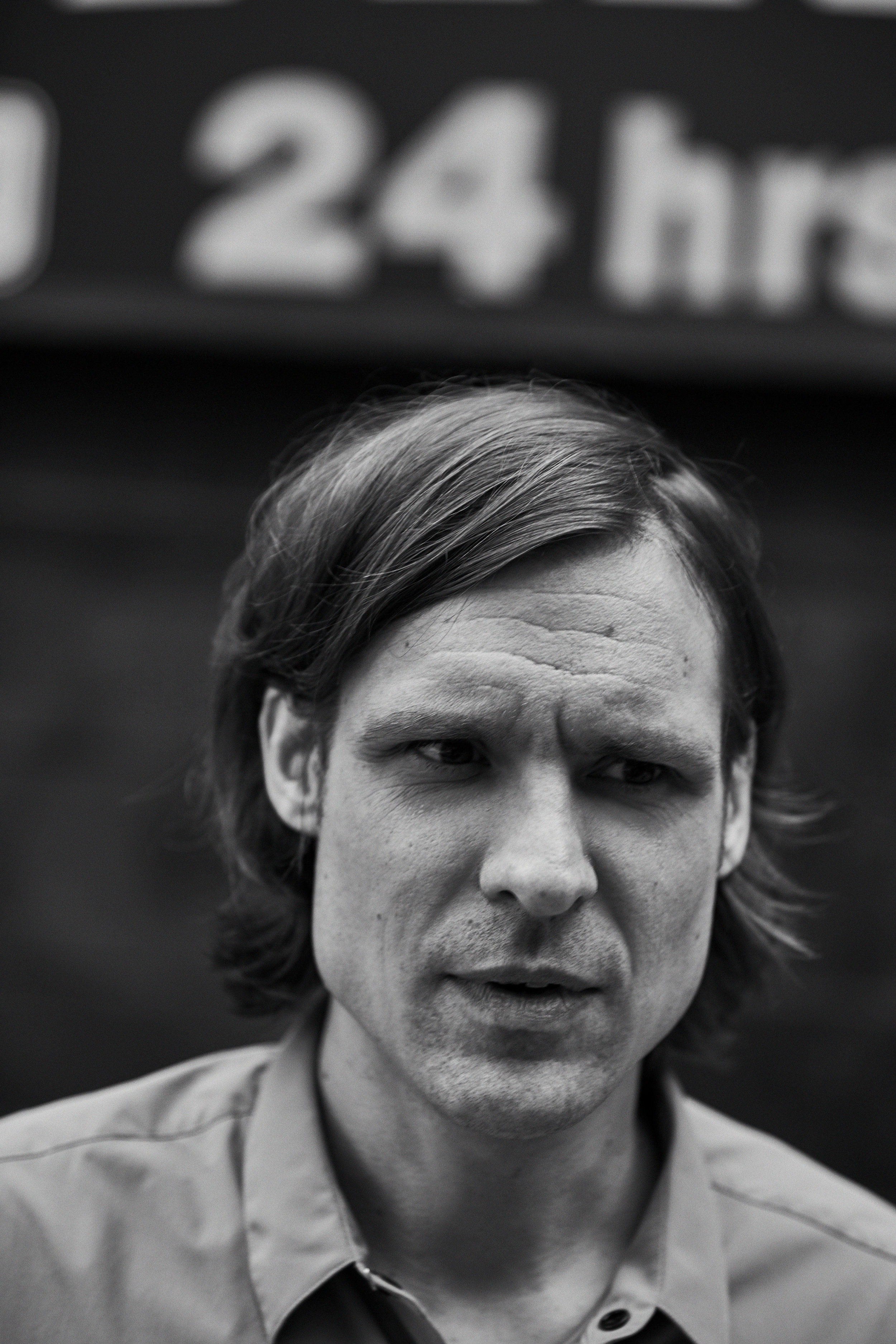
**THEORY** shirt.
* * *
Maus, 37, does have friends, and talented ones at that. He got his start collaborating with fellow art-pop weirdo visionaries Ariel Pink, Panda Bear, and Animal Collective before eventually heading off to pursue his own sound, which lays melancholy baritone over baroque, brooding, ‘80s-inflected synth-pop compositions. He hoped his efforts would be translated as an authentic personal breakthrough.
“I was making music and I understood that it sounded weird, relative to what was going on, but I thought that would make it all the more indispensable or, you know, interesting,” he tells me. Perhaps Maus’s music was too far ahead of its time. His first two albums, _Songs_ and _Love Is Real_, didn’t translate as he might have hoped, and were critically panned upon release.
“When it was taken up as sort of merely vanguard as opposed to a vanguard that broke through, I just ended up counting my blessings for that,” he reflects. “By that time I had already grown up anyway. My desires, my ambitions had matured.” Those new ambitions took him in an unexpected direction for an ‘indie’ artist: to the halls of academia.

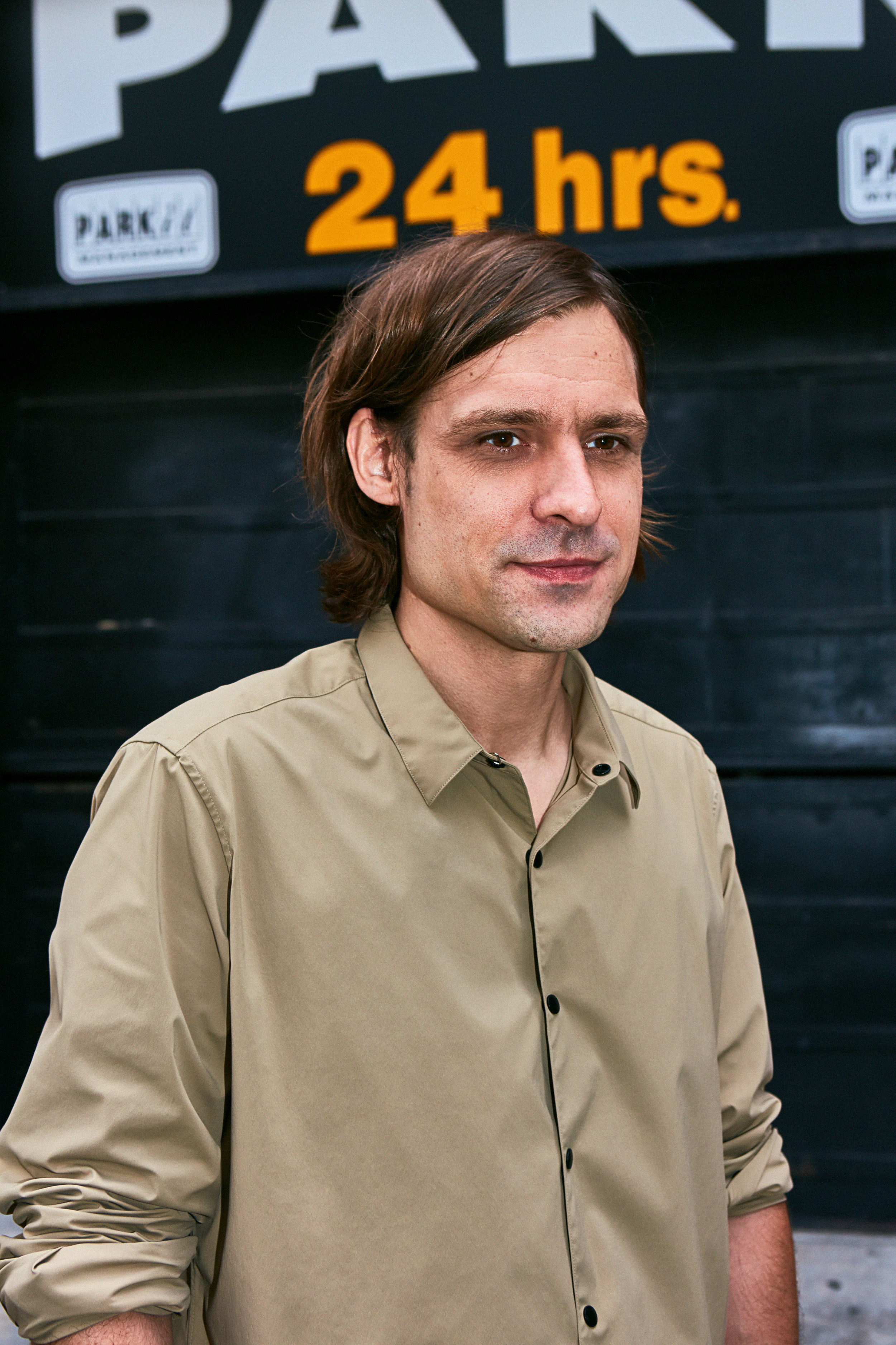
**THEORY** shirt.
* * *
After releasing _Love is Real_, he packed up his things and relocated from Minnesota to Honolulu, Hawaii where he studied for his Ph.D. in political philosophy and taught as a Professor of Philosophy at the University of Hawaii. That’s not to say that Maus quit music during this period. For the three or so years that Maus was studying and teaching in Hawaii, he spent most of his free time in the closet of his office producing the music that would later be heard on _We Must Become the Pitiless Censors of Ourselves_, his third studio album, which gained him the avant-garde notoriety that he patiently awaited.
And because of the album’s timely intersection with Maus’s philosophical studies (the title is taken from the writings of leftist French Philosopher Alain Badiou), it inevitably captures that particular moment in his life. Maus elaborates in a characteristically frenetic outpouring of words: “Initially I thought they didn’t really intersect very much, or they did only after I was done writing the music, when it came time to speak about it myself,” he explains. “That process served as a way of critically translating the work or thinking about it in language.”
While his philosophical studies shaped the content, his physical environment shaped the sound. “Wherever you are, if you’re writing something or making something, it’ll take you back to that place,” Maus muses. “That whole album. The resonance. You clap your hands in a room and record it, it’s recording the sound of your hands being clapped but then also all the reflections off the walls of the room that pass through the air in the room. The air of Oahu is captured on that album all throughout.”
Now, six years after his first critical breakthrough, Maus is capturing another significant moment in time with the release of his fourth studio album, the ominous, apocalyptically inclined _Screen Memories_—namely, the trauma and ensuing political malaise after the 2016 election.
“I really was shooting to get it out around that time,” he tells me. “I thought it would have resonated well with the apocalyptic despair that seemed to wash over the country, America, the United States, around that election. I think it was very well-suited to that. Perfectly suited to it.”


**TOPMAN** shirt.
* * *
The title refers to Sigmund Freud’s paper on the recollection of trauma in hysteria, but also operates on multiple levels, according to Maus, including his own: “My biggest opiate is the screen,” he confesses. “I have very few, if any, vices that rob me of my spiritual bread more than television.”
In “The Combine,” a single off the new album, you hear Maus somberly echoing lyrics like, “I see the combine coming, it’s going to dust us all to nothing,” in which the combine serves as a metaphor for the final judgment. “Finally at the end, the flowers are separated from the weeds. The weeds are fucking thrown into the fire and the fruit is ennobled into the light or whatever. I guess a more pragmatic, down to earth way of explaining it, is you could get hit by a car or a fucking tile could hit you on your head when you’re walking down the street.”
It’s clear that Maus is not here to be our philosopher-savior, or to offer false hope. Instead, he’s synthesizing and reflecting our world, and in a dark time that means a dark response. “It’s only gonna get worse,” Maus explains, juxtaposing the haunting nature of his record with the political state of our country.
“Like, put more simply, it’s not fun and dancy, and maybe that’s okay because when the thunder bolt comes from the sky we’re not gonna be playing flutes and taking our shoes off and dancing in our socks, you know what I mean?”
* * *
Written by Calla Camero.
Photographed by Max Montgomery.
Groomer: Nate Rosenkranz at Honey Artists.
 
**John Maus** | images by Max Montgomery | FASHION CREDIT: **TOPMAN** t-shirt.
* * *
Talking to singer, composer, and academic John Maus is sort of like experiencing his music for the first time: an enigmatic, heady, and at times indecipherable experience, though always profound, surprising, and delightful. When we speak, he is once again ensconced in his secluded work-nook in Austin, Minnesota—his birthplace, and a location that, regardless of where he is in life, Maus always seems to find his way back home to.
The off-the-map environment (one of Austin’s few points of interest is a SPAM Museum) is reflected in his idiosyncratic music, as if a bird as strange and beautiful as Maus might just require an unusual perch. I ask him whether this apparent isolation from the public was intentional. “I never preferred it,” he tells me. “It is interesting what it can do, in the central solitude of the work of writing and music. You’re allowed your own course, not being disturbed. There are benefits to that. But when all is said and done, it’s always a better bet to have some friends.”

**John Maus** | images by Max Montgomery | FASHION CREDIT: **TOPMAN** t-shirt.
* * *
Talking to singer, composer, and academic John Maus is sort of like experiencing his music for the first time: an enigmatic, heady, and at times indecipherable experience, though always profound, surprising, and delightful. When we speak, he is once again ensconced in his secluded work-nook in Austin, Minnesota—his birthplace, and a location that, regardless of where he is in life, Maus always seems to find his way back home to.
The off-the-map environment (one of Austin’s few points of interest is a SPAM Museum) is reflected in his idiosyncratic music, as if a bird as strange and beautiful as Maus might just require an unusual perch. I ask him whether this apparent isolation from the public was intentional. “I never preferred it,” he tells me. “It is interesting what it can do, in the central solitude of the work of writing and music. You’re allowed your own course, not being disturbed. There are benefits to that. But when all is said and done, it’s always a better bet to have some friends.”
 
**THEORY** shirt.
* * *
Maus, 37, does have friends, and talented ones at that. He got his start collaborating with fellow art-pop weirdo visionaries Ariel Pink, Panda Bear, and Animal Collective before eventually heading off to pursue his own sound, which lays melancholy baritone over baroque, brooding, ‘80s-inflected synth-pop compositions. He hoped his efforts would be translated as an authentic personal breakthrough.
“I was making music and I understood that it sounded weird, relative to what was going on, but I thought that would make it all the more indispensable or, you know, interesting,” he tells me. Perhaps Maus’s music was too far ahead of its time. His first two albums, _Songs_ and _Love Is Real_, didn’t translate as he might have hoped, and were critically panned upon release.
“When it was taken up as sort of merely vanguard as opposed to a vanguard that broke through, I just ended up counting my blessings for that,” he reflects. “By that time I had already grown up anyway. My desires, my ambitions had matured.” Those new ambitions took him in an unexpected direction for an ‘indie’ artist: to the halls of academia.

**THEORY** shirt.
* * *
Maus, 37, does have friends, and talented ones at that. He got his start collaborating with fellow art-pop weirdo visionaries Ariel Pink, Panda Bear, and Animal Collective before eventually heading off to pursue his own sound, which lays melancholy baritone over baroque, brooding, ‘80s-inflected synth-pop compositions. He hoped his efforts would be translated as an authentic personal breakthrough.
“I was making music and I understood that it sounded weird, relative to what was going on, but I thought that would make it all the more indispensable or, you know, interesting,” he tells me. Perhaps Maus’s music was too far ahead of its time. His first two albums, _Songs_ and _Love Is Real_, didn’t translate as he might have hoped, and were critically panned upon release.
“When it was taken up as sort of merely vanguard as opposed to a vanguard that broke through, I just ended up counting my blessings for that,” he reflects. “By that time I had already grown up anyway. My desires, my ambitions had matured.” Those new ambitions took him in an unexpected direction for an ‘indie’ artist: to the halls of academia.
 
**THEORY** shirt.
* * *
After releasing _Love is Real_, he packed up his things and relocated from Minnesota to Honolulu, Hawaii where he studied for his Ph.D. in political philosophy and taught as a Professor of Philosophy at the University of Hawaii. That’s not to say that Maus quit music during this period. For the three or so years that Maus was studying and teaching in Hawaii, he spent most of his free time in the closet of his office producing the music that would later be heard on _We Must Become the Pitiless Censors of Ourselves_, his third studio album, which gained him the avant-garde notoriety that he patiently awaited.
And because of the album’s timely intersection with Maus’s philosophical studies (the title is taken from the writings of leftist French Philosopher Alain Badiou), it inevitably captures that particular moment in his life. Maus elaborates in a characteristically frenetic outpouring of words: “Initially I thought they didn’t really intersect very much, or they did only after I was done writing the music, when it came time to speak about it myself,” he explains. “That process served as a way of critically translating the work or thinking about it in language.”
While his philosophical studies shaped the content, his physical environment shaped the sound. “Wherever you are, if you’re writing something or making something, it’ll take you back to that place,” Maus muses. “That whole album. The resonance. You clap your hands in a room and record it, it’s recording the sound of your hands being clapped but then also all the reflections off the walls of the room that pass through the air in the room. The air of Oahu is captured on that album all throughout.”
Now, six years after his first critical breakthrough, Maus is capturing another significant moment in time with the release of his fourth studio album, the ominous, apocalyptically inclined _Screen Memories_—namely, the trauma and ensuing political malaise after the 2016 election.
“I really was shooting to get it out around that time,” he tells me. “I thought it would have resonated well with the apocalyptic despair that seemed to wash over the country, America, the United States, around that election. I think it was very well-suited to that. Perfectly suited to it.”

**THEORY** shirt.
* * *
After releasing _Love is Real_, he packed up his things and relocated from Minnesota to Honolulu, Hawaii where he studied for his Ph.D. in political philosophy and taught as a Professor of Philosophy at the University of Hawaii. That’s not to say that Maus quit music during this period. For the three or so years that Maus was studying and teaching in Hawaii, he spent most of his free time in the closet of his office producing the music that would later be heard on _We Must Become the Pitiless Censors of Ourselves_, his third studio album, which gained him the avant-garde notoriety that he patiently awaited.
And because of the album’s timely intersection with Maus’s philosophical studies (the title is taken from the writings of leftist French Philosopher Alain Badiou), it inevitably captures that particular moment in his life. Maus elaborates in a characteristically frenetic outpouring of words: “Initially I thought they didn’t really intersect very much, or they did only after I was done writing the music, when it came time to speak about it myself,” he explains. “That process served as a way of critically translating the work or thinking about it in language.”
While his philosophical studies shaped the content, his physical environment shaped the sound. “Wherever you are, if you’re writing something or making something, it’ll take you back to that place,” Maus muses. “That whole album. The resonance. You clap your hands in a room and record it, it’s recording the sound of your hands being clapped but then also all the reflections off the walls of the room that pass through the air in the room. The air of Oahu is captured on that album all throughout.”
Now, six years after his first critical breakthrough, Maus is capturing another significant moment in time with the release of his fourth studio album, the ominous, apocalyptically inclined _Screen Memories_—namely, the trauma and ensuing political malaise after the 2016 election.
“I really was shooting to get it out around that time,” he tells me. “I thought it would have resonated well with the apocalyptic despair that seemed to wash over the country, America, the United States, around that election. I think it was very well-suited to that. Perfectly suited to it.”
 
**TOPMAN** shirt.
* * *
The title refers to Sigmund Freud’s paper on the recollection of trauma in hysteria, but also operates on multiple levels, according to Maus, including his own: “My biggest opiate is the screen,” he confesses. “I have very few, if any, vices that rob me of my spiritual bread more than television.”
In “The Combine,” a single off the new album, you hear Maus somberly echoing lyrics like, “I see the combine coming, it’s going to dust us all to nothing,” in which the combine serves as a metaphor for the final judgment. “Finally at the end, the flowers are separated from the weeds. The weeds are fucking thrown into the fire and the fruit is ennobled into the light or whatever. I guess a more pragmatic, down to earth way of explaining it, is you could get hit by a car or a fucking tile could hit you on your head when you’re walking down the street.”
It’s clear that Maus is not here to be our philosopher-savior, or to offer false hope. Instead, he’s synthesizing and reflecting our world, and in a dark time that means a dark response. “It’s only gonna get worse,” Maus explains, juxtaposing the haunting nature of his record with the political state of our country.
“Like, put more simply, it’s not fun and dancy, and maybe that’s okay because when the thunder bolt comes from the sky we’re not gonna be playing flutes and taking our shoes off and dancing in our socks, you know what I mean?”
* * *
Written by Calla Camero.
Photographed by Max Montgomery.
Groomer: Nate Rosenkranz at Honey Artists.

**TOPMAN** shirt.
* * *
The title refers to Sigmund Freud’s paper on the recollection of trauma in hysteria, but also operates on multiple levels, according to Maus, including his own: “My biggest opiate is the screen,” he confesses. “I have very few, if any, vices that rob me of my spiritual bread more than television.”
In “The Combine,” a single off the new album, you hear Maus somberly echoing lyrics like, “I see the combine coming, it’s going to dust us all to nothing,” in which the combine serves as a metaphor for the final judgment. “Finally at the end, the flowers are separated from the weeds. The weeds are fucking thrown into the fire and the fruit is ennobled into the light or whatever. I guess a more pragmatic, down to earth way of explaining it, is you could get hit by a car or a fucking tile could hit you on your head when you’re walking down the street.”
It’s clear that Maus is not here to be our philosopher-savior, or to offer false hope. Instead, he’s synthesizing and reflecting our world, and in a dark time that means a dark response. “It’s only gonna get worse,” Maus explains, juxtaposing the haunting nature of his record with the political state of our country.
“Like, put more simply, it’s not fun and dancy, and maybe that’s okay because when the thunder bolt comes from the sky we’re not gonna be playing flutes and taking our shoes off and dancing in our socks, you know what I mean?”
* * *
Written by Calla Camero.
Photographed by Max Montgomery.
Groomer: Nate Rosenkranz at Honey Artists.
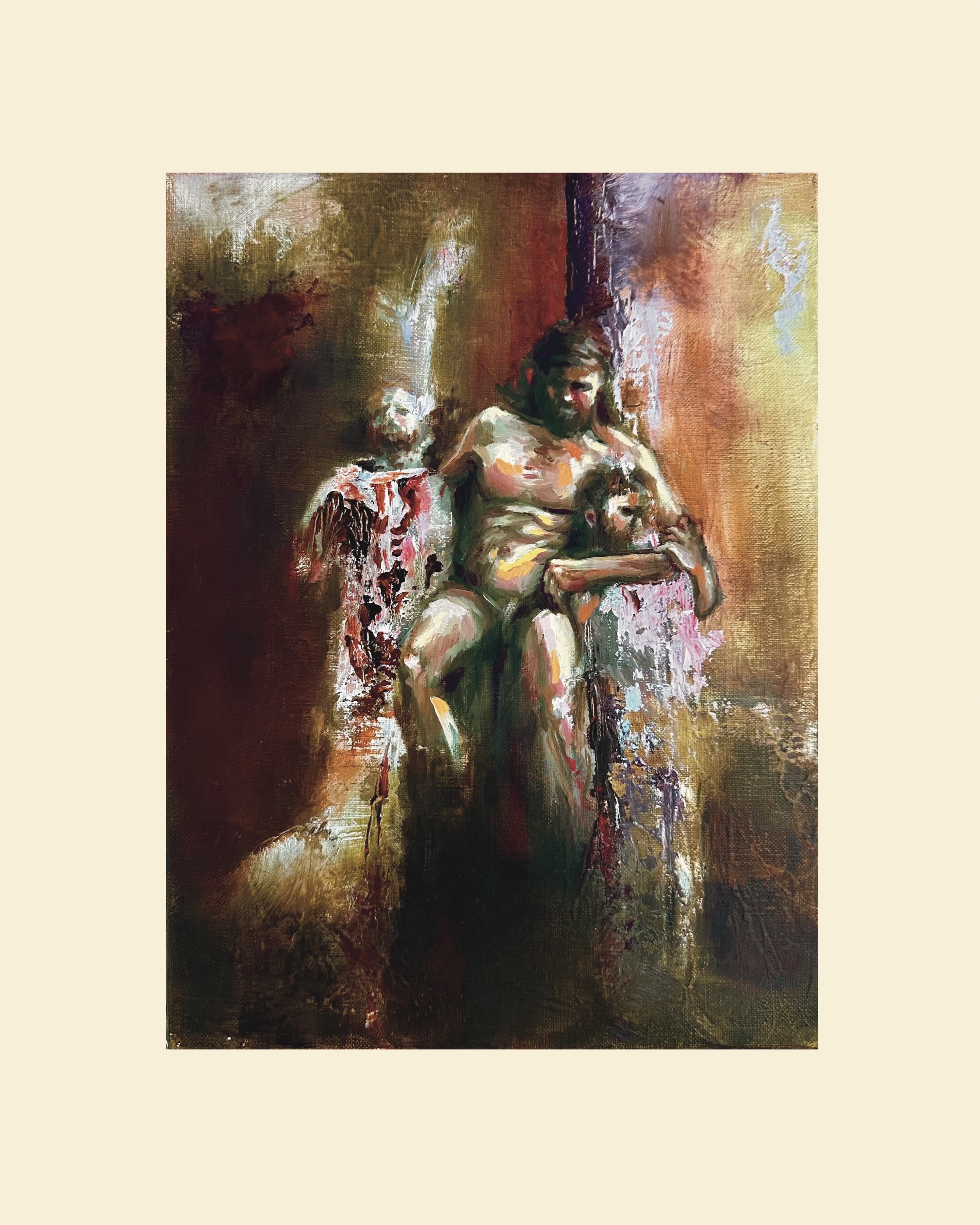



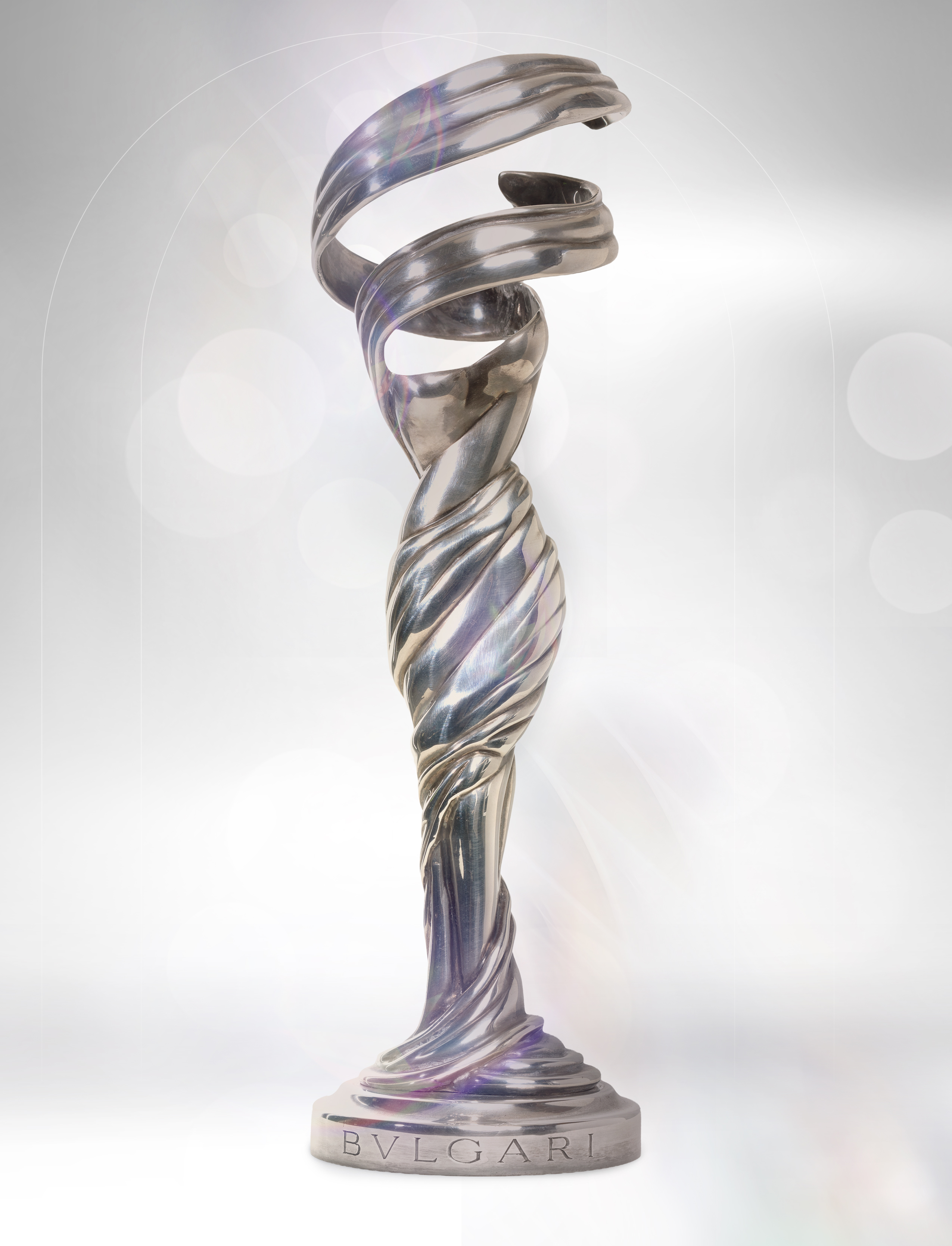
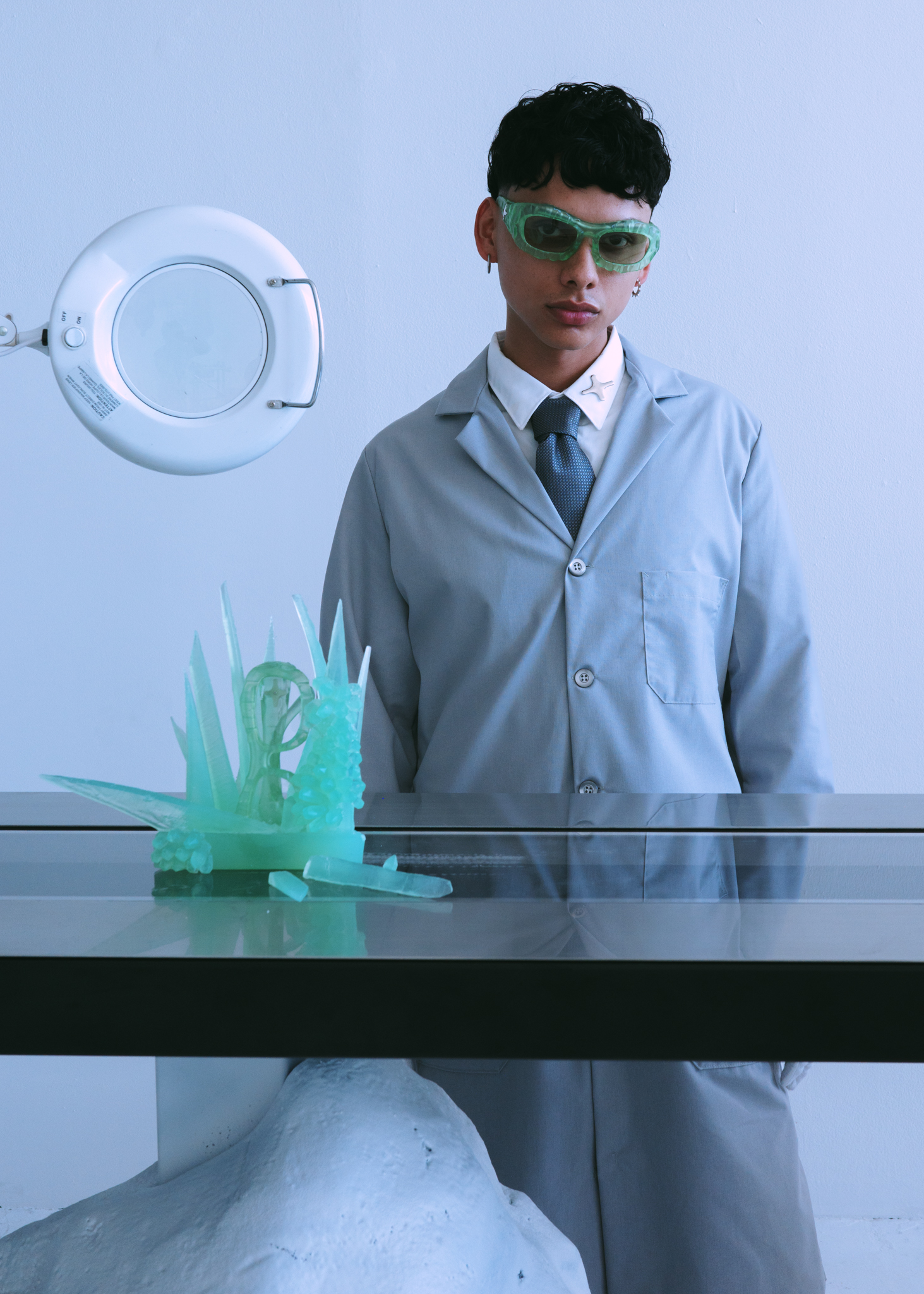

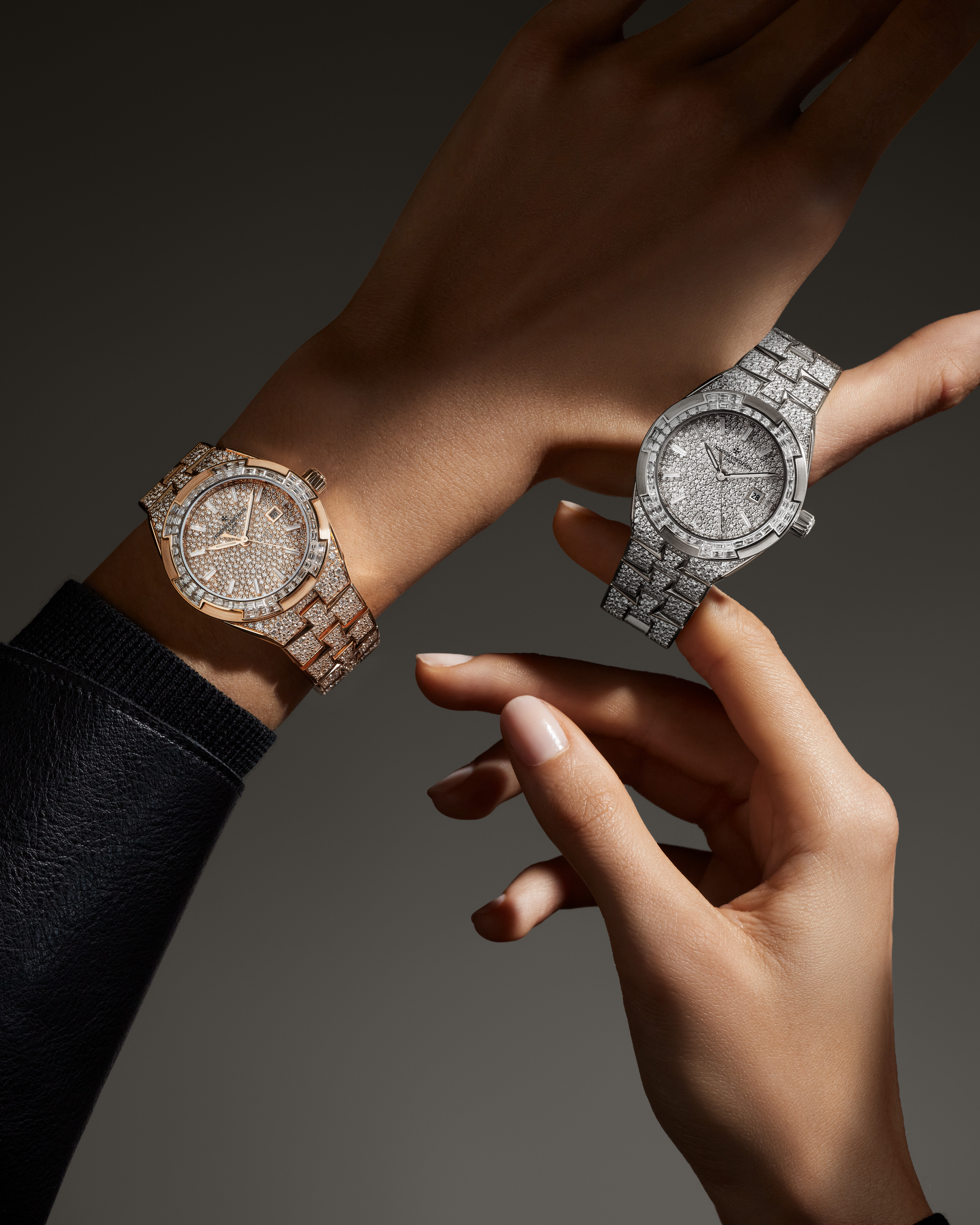
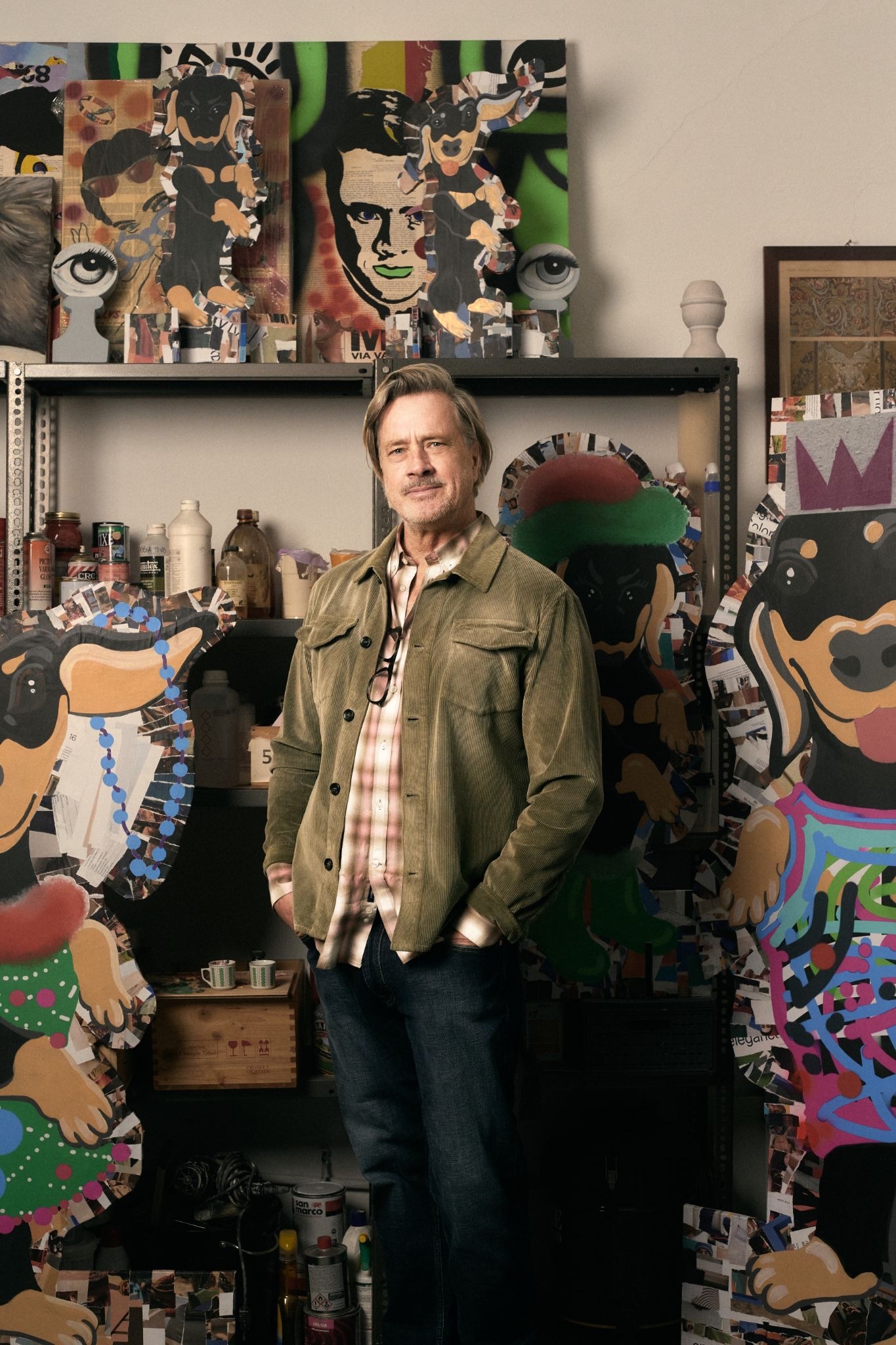
.JPG)
.jpg)

